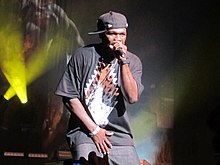
Back Kletsrym Afrikaans Rap ALS راب Arabic راپ ARY راب ARZ ৰেপাৰ Assamese Rap AST Rep Azerbaijani رپ AZB Рэп Byelorussian

Rapping (also rhyming, flowing, spitting,[1] emceeing[2] or MCing[2][3]) is an artistic form of vocal delivery and emotive expression that incorporates "rhyme, rhythmic speech, and [commonly] street vernacular".[4] It is usually performed over a backing beat or musical accompaniment.[4] The components of rap include "content" (what is being said, e.g., lyrics), "flow" (rhythm, rhyme), and "delivery" (cadence, tone).[5] Rap differs from spoken-word poetry in that it is usually performed off-time to musical accompaniment.[6] It also differs from singing, which varies in pitch and does not always include words. Because they do not rely on pitch inflection, some rap artists may play with timbre or other vocal qualities. Rap is a primary ingredient of hip hop music, and so commonly associated with that genre that it is sometimes called "rap music".
Precursors to modern rap music include the West African griot tradition,[7] certain vocal styles of blues[8] and jazz,[9] an African-American insult game called playing the dozens (see Battle rap and Diss),[10] and 1960s African-American poetry.[11] Stemming from the hip-hop cultural movement, rap music originated in the Bronx, New York City, in the early 1970s and became part of popular music later that decade.[12] Rapping developed from the role of master of ceremonies (MC) at parties within the scene, who would encourage and entertain guests between DJ sets, which evolved into longer performances.
Rap is usually delivered over a beat, typically provided by a DJ, turntablist, or beatboxer when performing live. Much less commonly a rapper can decide to perform a cappella, meaning without accompaniment of any sort, beat(s) included. When a rap or hip-hop artist is creating a song, "track", or record, done primarily in a production studio, most frequently a producer provides the beat(s) for the MC to flow over. Stylistically, rap occupies a gray area between speech, prose, poetry, and singing.[13] The word, which predates the musical form, originally meant "to lightly strike",[14] and is now used to describe quick speech or repartee.[15] The word had been used in British English since the 16th century. It was part of the African American dialect of English in the 1960s meaning "to converse", and very soon after that came to denote the musical style.[16] The word "rap" is so closely associated with hip-hop music that many writers use the terms interchangeably.
- ^ Duneier, Kasinitz, Murphy (2014). The Urban Ethnography Reader. Oxford University Press. ISBN 978-0-19-974357-5.
{{cite book}}: CS1 maint: multiple names: authors list (link) - ^ a b Edwards 2009, p. xii.
- ^ Edwards 2009, p. 81.
- ^ a b Cite error: The named reference
:0was invoked but never defined (see the help page). - ^ Edwards 2009, p. x.
- ^ Golus, Carrie (2012). From Def Jam to Super Rich. Twenty First Century Books. p. 22. ISBN 978-0-7613-8157-0.
- ^ Cite error: The named reference
:2was invoked but never defined (see the help page). - ^ Cite error: The named reference
tonywas invoked but never defined (see the help page). - ^ Cite error: The named reference
digitopiawas invoked but never defined (see the help page). - ^ Smith (October 16, 2014). "Not just Yo' Mama but Rap's Mama: The Dozens, African American Culture and the Origins of Battle Rap". U.S. STUDIES ONLINE PGR & ECR NETWORK FOR THE BRITISH ASSOCIATION FOR AMERICAN STUDIES. British Association of American Studies. Retrieved March 4, 2023.
- ^ Cite error: The named reference
ny-aliwas invoked but never defined (see the help page). - ^ Hoffmann, Frank (2007). Rhythm and Blues, Rap, and Hip-Hop (American Popular Music). Checkmark Books. pp. 63. ISBN 978-0-8160-7341-2.
- ^ Kovacs, Karl (2014). From Grassroots to Comercialization: Hip Hop and Rap Music in the USA. Anchor Academic Publishing. p. 4. ISBN 9783954892518.
- ^ "Dictionary.com". Retrieved February 2, 2008.
- ^ Oxford English Dictionary
- ^ Safire, William (1992), "On language; The rap on hip-hop", The New York Times Magazine.
© MMXXIII Rich X Search. We shall prevail. All rights reserved. Rich X Search